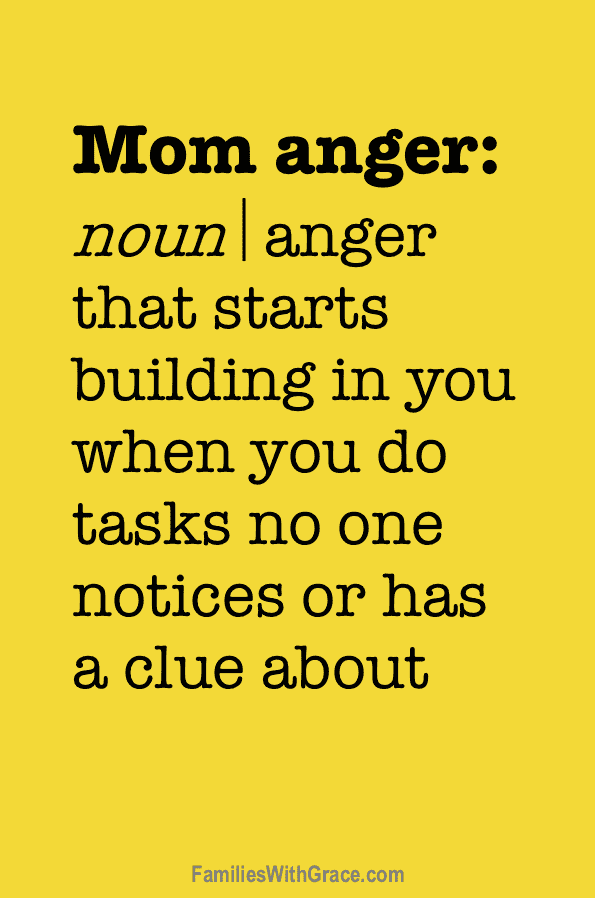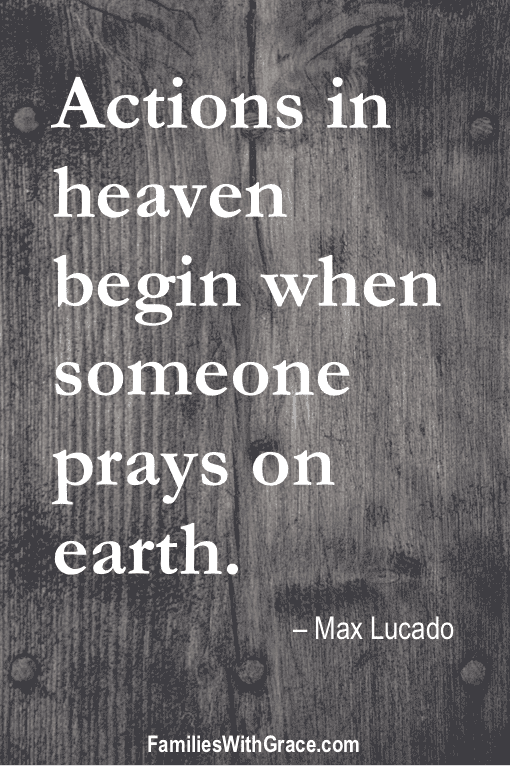Overcoming anger at doing tasks nobody cares about or notices
Mom anger is an issue we don’t talk about often enough. I’ve felt it so many times, and I’m guessing you have, too. I’m talking about anger that starts building in you when you do a task that no one notices or has a clue about.
Why are you the ONLY one who sees the bathroom trash overflowing and takes it out?
Why are you the ONLY one who empties the dishwasher when the dishes are clean?
Why are you the ONLY one who remembers to stop by the grocery store and pick up bread to make lunches for the next day?
Why are you the ONLY one who remembered to sign the kids’ permission slips and put them in their backpacks?
Why are you the ONLY one who seems to be able to remember to put dirty socks in the hamper?
Where mom anger comes from
Moms have this whole running list in their heads at all times. I’d bet you could tell me right now how much milk/bread/cereal/whatever-staple-your-family-relies-on is in your pantry or fridge.
I can tell you that I just opened our last gallon of milk this morning. We have three slices of bread, so I need to buy more today. Our granola/cereal bars (my family’s other staple) are pretty well stocked right now.
I also know the level of fullness for each trashcan in my house at pretty much any given time. I have a list in my head to know what laundry needs to be done. And I know I need to return our library books due tomorrow.
My husband doesn’t know these things. My kids don’t know these things. They don’t have to know these things, because I do and I take care of them. Will they help when I ask them to? Yes, usually. But they don’t have that running list in their heads.
And they also don’t have the anger that sometimes comes along with it. Just this morning, I was doing some household chores before coming into the home office to work. My husband went straight to the office to start work after taking the kids to school. He didn’t make a stop-off for household chores, because his job is much more demanding than mine. His paycheck is also our primary source of income. The workday starts for him promptly at 8 a.m. Mine is more flexible by far.
HOWEVER, even though my head knows these things sometimes I trip up. I get that little voice being like, “Why is it always you who thinks to change the sheets?” Or I start resenting that he can just go to work without having these chores hanging over his head. None of that is a recipe for a peaceful, loving, grace-filled marriage. It’s a recipe for building resentment and anger.
Shifting my perspective
Because when I stop to really think about it, I can flip the perspective. My husband could easily wonder why he has to take the kids to school while I’m home in my PJs. (In my defense, this is the first year that’s happened. Instead I take over all kid-care duties before school.)
Or as he heads into the office to work while I head upstairs to do some household chores, he could wonder why he has to be the one who makes the primary income.
I thought about these things this morning as I was doing chores that no one will notice or thank me for. I realized I was feeling sorry for myself that nobody says thank you each time I do a task to keep our household running smoothly. And I was feeling angry that nobody would think to do some of these tasks, let alone thank me for them. I kept thinking (because what else is there to do when you are wiping down counters and toilets?!). I asked myself WHY I was cleaning.
Once I got past the dramatic and sarcastic responses like “Because if I don’t then nobody will and we’ll all get horrible germs and die?” or “Because I’m just living the dream over here,” I found my answer. Every household chore I do, I do because it serves the people I love. The real reason I’m cleaning bathrooms, changing sheets and doing laundry is because that’s what the people I love need me to do.
Some of them are too young to do some of these tasks themselves. Some of them are too busy earning an income for our family. And this really is what I signed up for.
Letting go of the anger
When I’m doing tasks out of love, suddenly my anger dissipates. When I’m washing lunchbox containers, meal planning, grocery shopping, bagging up trash, folding laundry or making food, I’m doing it because I have been blessed with people to love and take care of. Why in the world do I let myself harbor mom anger about that?

Yet, I do sometimes find myself getting angry about those things. I need a reminder. I need perspective. Most of all, I need to remember that it’s not about me. If I wanted thanks and accolades from my family, then I could easily feed my kids dessert for dinner and get plenty of thanks. But what I want is my family to be taken care of. If it’s in my power to do so, then I should do so without anger at them. So many times I have thanked God for my husband and my children. How dare I get angry at taking care of them?
So each time I start to feel that mom anger creep in again, I think about these things. BUT, I also want to be clear that just because I CAN do things to take care of my family doesn’t mean that I HAVE to do everything. My husband and I still talk about household chores and how we are dividing them.
My children still have responsibilities and chores they are required to do according to their age. And they each also pitch in and help me with the chores I usually do when I don’t feel well thanks to my chronic health issues. (Yes, these very same sweet, loving, compassionate folks are the ones I sometimes get angry with…)
I also still do justifiably get irritated or angry with my family sometimes when they don’t listen to me or do what I asked them to do without a good reason. Though I try to listen and give grace, sometimes my kids are testing limits or giving me an attitude that just isn’t acceptable.
I am working, though, to make sure I don’t harbor an attitude of resentment and anger toward my husband or children simply for existing and needing things from me. Above all, I want to do everything I do for my family out of love for them and not out of an angry feeling of obligation. It’s not always easy. And I totally mess up sometimes. But many other times, I wash another load of laundry or scrub another toilet without a second thought because it’s what my loved ones need.
















